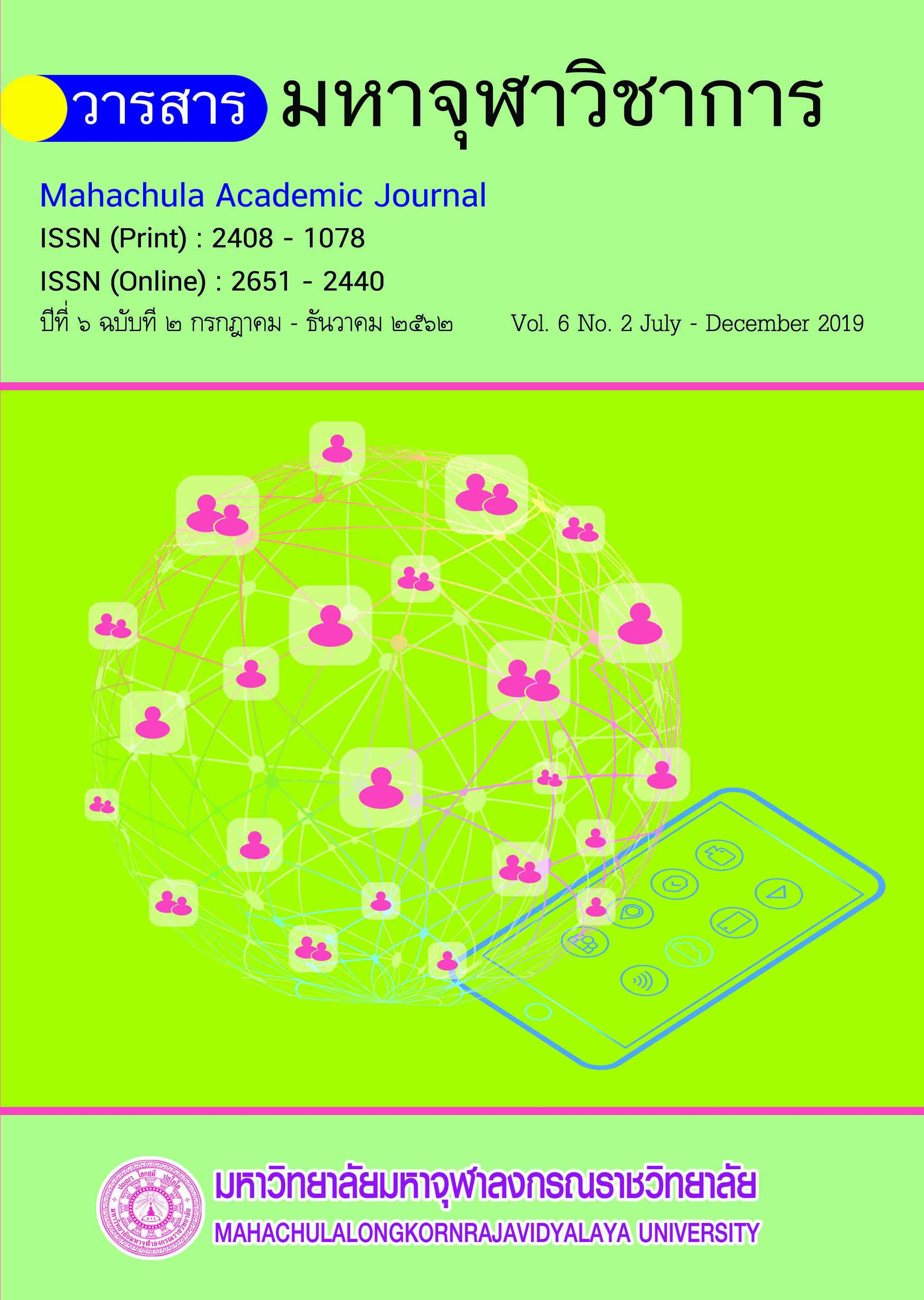The Way of Youth Behavior Development According to Buddhist Integration
Main Article Content
Abstract
This Purpose of this research and the objectives are as follows: (i) to study the awakening model youth behavior,(ii)to study the development of the youth behavior by the principle in Buddhism, and (iii) to present the way of youth behavior on the awakening model according to Buddhist integration. Itis studied by the documents, the related research, and in-depth interview. The result of the study found that:-
The youths are pivotal in the nation as they appeared in the national economic and social development plan. At the same time, Thai youths are the very group of the problem in society. It is the reason that the youths who have no behavior adjustment must be in social problems, caused by both the external and internal mind. The various environments such as taking care, the mental warmth, family cooperation, the education influencing human behavior. It is the reason for human development.
Buddhist principles support the development of wisdom. The mind can train in accordance with utterance (Paratoghosa) is a positive external impulsion, the systematically thinking with theYonisomanasikãra, with faith as the associated with knowledge,the another’s approaching the Kalyamitta (good friend) who learn the Dhamma, not associated with the friend lead to the ruin, distinguishing between the true and false friends, choosing the association with the good friend. The Buddhisteducation is the development of behavior mental and wisdom, with the Four FoundationsofMindfulness; body, feeling, mind, and mind-objects, and reach the Way of Behavior Development.
It is important to find out the way of youth behavior development on the awakening model according to Buddhist integration. In theory, I had brought integrated Buddhist principles, to the concept and the psychology principles. In another way, it had brought integrated the Buddhist principles, to the concept and the psychology principles, to the meditation practice with the Four Foundations of Mindfulness. This dissertation gets the new Model with three visions. The youths, who cultivated the practice and create the culture of awakening by wisdom, they can have self-confidence, good behavior, and cultivated.
Article Details
References
มหาจุฬาลงกรณราชวิทยาลัย. พระไตรปิฎกภาษาไทยฉบับมหาจุฬาลงกรณราชวิทยาลัย. กรุงเทพมหานคร: มหาจุฬาลงกรณราชวิทยาลัย, ๒๕๓๙.
มูลนิธิโพธิวัณณา. โครงการปฏิบัติธรรม. ฉะเชิงเทรา: ศูนย์วิปัสสนากรรมฐานมูลนิธิโพธิวัณณา, ๒๕๕๙
ประเสริฐ ผลิตผลการพิมพ์. วัยรุ่นไม่มีปัญหา. กรุงเทพมหานคร: สำนักพิมพ์ฟิสิกส์เซ็นเตอร์, ๒๕๔๙.
พุทธทาสภิกขุ. วิปัสสนาในอิริยาบถนั่ง. กรุงเทพมหานคร: ธรรมสภา, ๒๕๔๒.
พระพรหมคุณาภรณ์(ป.อ.ปยุตฺโต). พุทธธรรม. ฉบับพิมพ์ครั้งที่ ๔๓. กรุงเทพมหานคร: โรงพิมพ์ผลิธัมม์, ๒๕๔๖.
วิทยากร เชียงกูล. ปัญหาเศรษฐกิจสังคมที่มีผลต่อเด็กและเยาวชนไทย. กรุงเทพมหานคร: ผลึก, ๒๕๓๓.
สุชา จันทร์เอม และคณะ. จิตวิทยาการศึกษา. พิมพ์ครั้งที่ ๔. กรุงเทพมหานคร: แพร่พิทยา, ๒๕๔๕.
สุชา จันทร์เอม และคณะ. จิตวิทยาทั่วไป. พิมพ์ครั้งที่ ๖. กรุงเทพมหานคร : ไทยวัฒนาพานิช, ๒๕๓๓.
สร้อยตระกูล อรรถมานะ. พฤติกรรมองค์การทฤษฎีและการประยุกต์. กรุงเทพมหานคร: สำนักพิมพ์มหาวิทยาลัยธรรมศาสตร์, ๒๕๔๔.
สมเด็จพระพุทธโฆษาจารย์ (ป.อ.ปยุตโต). พุทธศาสนากับสังคมไทย. กรุงเทพมหานคร: สำนักพิมพ์มูลนิธิโกมลคีมทอง, ๒๕๕๒.
สำนักงานคณะกรรมการสภาเศรษฐกิจและสังคมแห่งชาติ. แผนพัฒนาเศรษฐกิจและสังคมแห่งชาติ ฉบับที่ ๑๑ (๒๕๕๕ – ๒๕๖๐). กรุงเทพมหานคร: สำนักงานคณะกรรมการสภาเศรษฐกิจและสังคมแห่งชาติ, ๒๕๕๕.
สมชาย เตียงกุล และคณะ.“โครงการพัฒนาศักยภาพเครือข่ายเยาวชนต้นแบบสร้างพลังเครือข่ายสานใจชุมชน”. รายงานการวิจัย. เชียงใหม่: ห้างหุ้นส่วนสามัญ ว๊อกซ์วูฟ จำกัด, ๒๕๔๙.
เอื้อมอร ชลวร. “การจัดการความรู้เชิงพุทธบูรณาการ”. พุทธศาสตรดุษฎีบัณฑิต สาขาวิชาพระพุทธศาสนา. บัณฑิตวิทยาลัย: มหาวิทยาลัยมหาจุฬาลงกรณราชวิทยาลัย, ๒๕๕๕.
ดวงเดือน พันธุมนาวิน. “การใช้ผลผลิตจากการวิจัยทางจิตพฤติกรรมศาสตร์เพื่อการพัฒนาคนไทย”. วารสารจิตวิทยา. ปีที่ ๓ ฉบับที่ ๒ (พฤษภาคม – สิงหาคม, ๒๕๓๙): ๔๖ – ๖๐.
อ้อมเดือน สดมณี. “การพัฒนาจิตพิสัยในมิติพฤติกรรมศาสตร์”. เอกสารประกอบการประชุมเชิงปฏิบัติการโครงการพัฒนาจิตพิสัยในระบบการเรียนการสอน. กรุงเทพมหานคร : สำนักงานคณะกรรมการวัฒนธรรมแห่งชาติ, ๒๕๔๐.


